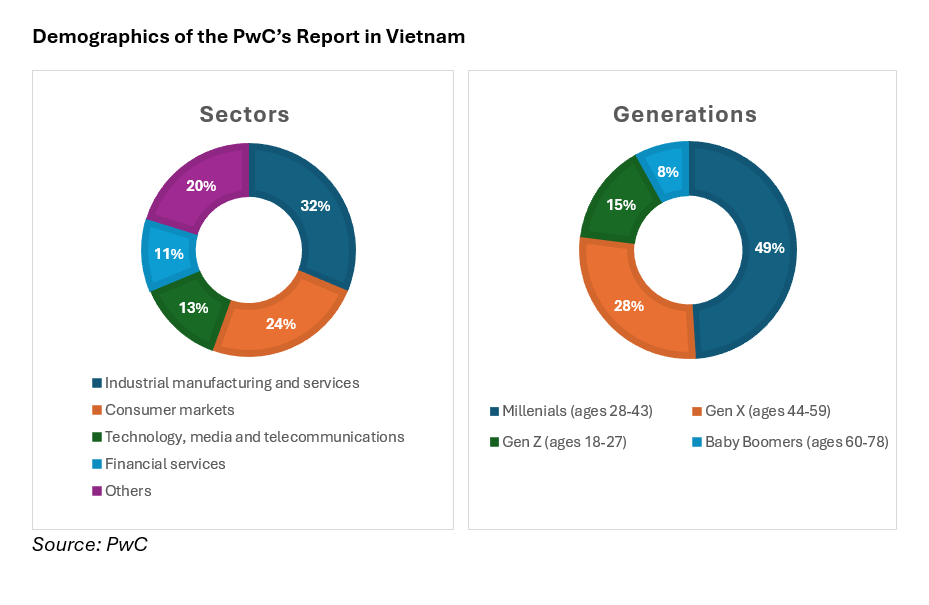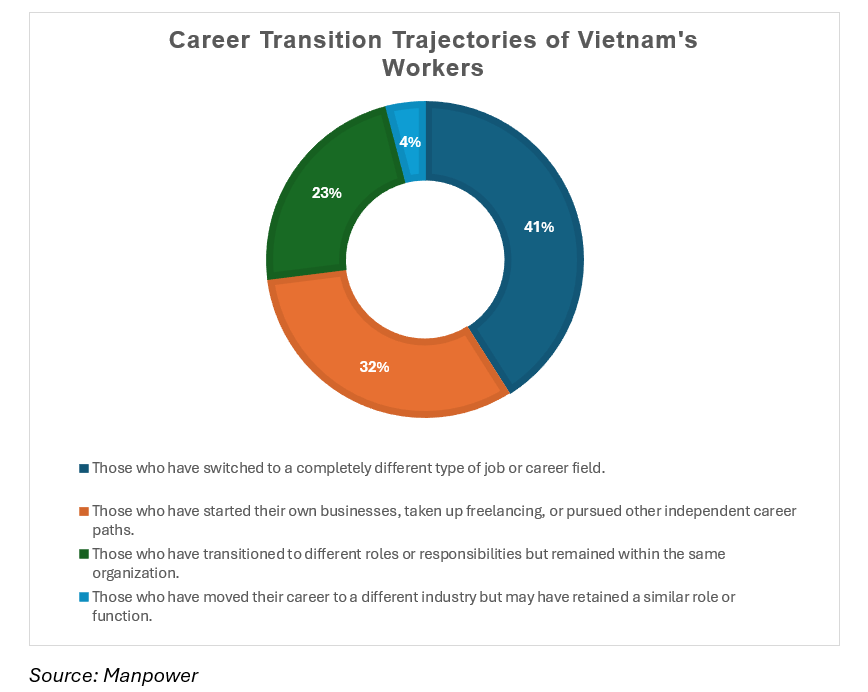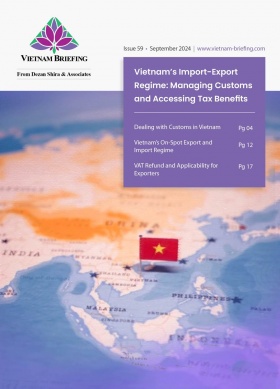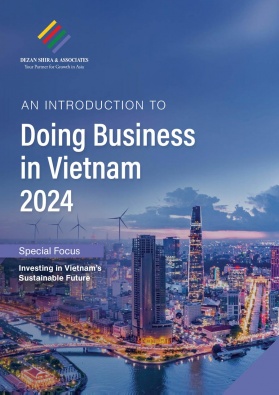Insights into the Vietnam Workforce in 2024: Key Takeaways for Businesses
Recent reports highlight how the Vietnam workforce in 2024 is proactively building resilience amid transformation while striving for work-life balance. Understanding these evolving priorities and the factors driving professional growth can help businesses in Vietnam create more effective talent recruitment and retention strategies.
Vietnam’s workforce amid constant change
In July, PwC released the Asia Pacific Workforce Hopes and Fears Survey 2024, emphasizing the need for businesses to support employee adaptation in this era of rapid transformation. The report revealed that 2024 has been a year of mixed emotions for Vietnamese workers—while they are eager to embrace new opportunities, they are also overwhelmed by increasing workloads and rapid shifts in the labor market.
The survey, which included 1,000 respondents from Vietnam (56 percent of whom were males and 44 percent females) among a total of 19,500 across the Asia Pacific region, explored employee perspectives on business sustainability, skill development, emerging technologies, climate initiatives, and workplace dynamics.
 Key insights into Vietnam’s workforce attitudes
Key insights into Vietnam’s workforce attitudes
Mixed sentiments toward change
In Vietnam, workers are divided in their feelings about change. While 92 percent are willing to adapt to new work practices and grow in their roles, 73 percent feel overwhelmed by the pace of transformation. Compared to the regional average, Vietnamese respondents reported a higher rate of workplace changes in the past year (88 percent).
This has led to mixed sentiments regarding job security. While 52 percent are confident about their employment over the next 12 months, 65 percent express concern due to recent changes. Financial compensation remains a top priority (82 percent), but non-financial aspects such as fulfillment and flexibility are also highly valued, with 75 percent and 70 percent, respectively, prioritizing these factors.
Commitment to skill development
Vietnamese employees demonstrate a strong commitment to enhancing their skills, with 71 percent expressing confidence in fully utilizing their capabilities, significantly higher than the regional average of 57 percent. Furthermore, 75 percent of respondents indicated that their employers support skill development through learning opportunities, compared to 52 percent regionally.
Workers in Vietnam are particularly attuned to the evolving skill requirements in their jobs, with 64 percent expecting significant changes over the next five years. This is well above the regional average of 44 percent. Additionally, they are aware of new trends like generative artificial intelligence (GenAI), with 55 percent having used it in the past year. Although only 25 percent use GenAI daily, optimism is growing, with 90 percent believing that it will improve their work quality, enhance skills, or boost creativity.
Pursuit of meaningful work
According to Manpower’s 2024 Vietnam Survey Report: The Quest for Meaning at Work, the search for meaningful work in Vietnam is closely linked to social impact, personal development, and the alignment of individual values with career goals. Among 274 respondents, 99 percent prioritized finding purpose in their professional lives.
Key components of meaningful work include:
- Personal fulfillment: Pursuing roles that align with personal values and passions.
- Work-life harmony: Balancing professional and personal commitments for well-being.
- Community and belonging: Valuing a collaborative and supportive work environment.
- Positive social impact: Engaging in work that contributes to societal improvement.
Sustainability consciousness
Manpower’s report shows that over half of the respondents expect companies to take proactive steps in promoting sustainability. They advocate for more roles focused on Environmental, Social, and Governance (ESG) responsibilities and educational programs on societal impact and sustainability. Furthermore, 85 percent of respondents consider a company’s social and environmental reputation when seeking employment, surpassing the Southeast Asia average of 77 percent.
These findings align with PwC’s survey, where 65 percent of Vietnamese workers view climate change as a tangible workplace threat. A significant 88 percent expect their employers to actively reduce environmental impact, compared to 73 percent regionally.
Career transitions: A strategic approach
Vietnamese workers are increasingly viewing career transitions as a strategic move for professional growth. Nearly half of Manpower’s respondents have planned or undergone a career change, with 72 percent reporting a positive impact on their well-being and job satisfaction. However, common obstacles to transitioning include:
- Limited availability of green and socially driven job opportunities.
- Balancing personal responsibilities with career aspirations.
- Lack of skills and experience.
- Costs associated with professional transitions.
- Limited information on green-impact sectors.
Challenges in the green-impact sector
Workers in Vietnam’s green-impact sector report a lack of exposure to sustainability and impact industries during their education, which limits their awareness of career opportunities. Additionally, societal expectations and skills gaps make transitioning to these sectors challenging.
Embracing ‘Plan B’
Many Vietnamese employees are open to returning to previous employers. A survey by Robert Walters revealed that 78 percent of professionals in Vietnam would consider rejoining a former employer for better career prospects or due to leadership changes. Maintaining relationships with past managers is common, with 91 percent staying in touch, and 33 percent reaching out about job opportunities in the past two years.
Strategic implications for employers
To retain and develop talent, businesses in Vietnam can consider the following strategies:
- Adapting work conditions: Flexible hours, comprehensive health insurance, and equitable pay to motivate employees.
- Promoting a positive image: Actively foster Diversity, Equity, and Inclusion (DEI) and champion sustainability initiatives to improve company reputation.
- Advancing ESG initiatives: Develop training programs focused on societal impact and sustainability, and create roles dedicated to ESG responsibilities.
- Encouraging skill development and innovation: Provide opportunities for employees to enhance their skills and knowledge, particularly in emerging technologies like GenAI.
- Managing ‘boomerang employees’: Maintain positive exit processes and rehire former employees strategically to address skill shortages, while managing potential conflicts with existing staff.
Conclusion
Understanding these insights can help businesses in Vietnam create more effective strategies to support their workforce through periods of change, ultimately fostering a resilient and engaged team.
About Us
Vietnam Briefing is one of five regional publications under the Asia Briefing brand. It is supported by Dezan Shira & Associates, a pan-Asia, multi-disciplinary professional services firm that assists foreign investors throughout Asia, including through offices in Hanoi, Ho Chi Minh City, and Da Nang in Vietnam. Dezan Shira & Associates also maintains offices or has alliance partners assisting foreign investors in China, Hong Kong SAR, Indonesia, Singapore, Malaysia, Mongolia, Dubai (UAE), Japan, South Korea, Nepal, The Philippines, Sri Lanka, Thailand, Italy, Germany, Bangladesh, Australia, United States, and United Kingdom and Ireland.
For a complimentary subscription to Vietnam Briefing’s content products, please click here. For support with establishing a business in Vietnam or for assistance in analyzing and entering markets, please contact the firm at vietnam@dezshira.com or visit us at www.dezshira.com
- Previous Article The Footwear Market in Vietnam: Trends and Opportunities
- Next Article Vietnam’s First Draft of New Personal Data Protection Law (PDPL) Released for Public Comments









